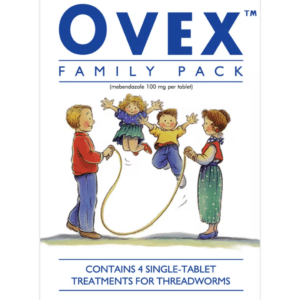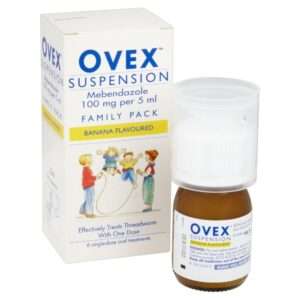What are Threadworms?
Threadworms, also known as pinworms, are the most common type of intestinal worm infection, frequently affecting children but also found in adults. These small, thin, white worms measure between 8-13mm in length. They inhabit the lower intestine and rectum, where female worms lay thousands of eggs around the anus, causing intense itching, especially at night.
You are most likely to see threadworms in the stool, particularly in the first bowel movement of the day; they appear as thin, cotton-like pieces. For an example, visit the NHS website
This itching can lead to discomfort and disrupted sleep. Threadworms spread easily through contact with contaminated surfaces or by ingesting eggs from bedding, clothing, or hands. Despite their small size, they can cause significant irritation. Quick and effective treatment is essential to manage this common issue. For relief, consider threadworm medication, including Ovex Family Pack and threadworm tablets for adults, which are designed to address and eradicate these parasites efficiently.
What Are the Symptoms of Threadworms?
Threadworm infections can cause several noticeable symptoms, primarily due to the irritation and discomfort caused by the worms. The most common symptom is intense itching around the anus, especially at night, which can lead to disturbed sleep and general discomfort. In some cases, you might also notice restless behaviour in children or difficulty sleeping. Other symptoms include irritability, and, occasionally, a mild stomach ache.
Threadworm infections may also lead to secondary infections if the itching causes broken skin. In rare instances, threadworms can cause itching around the vaginal area in females. Recognising these symptoms early and seeking prompt treatment with effective threadworm medication can help manage the infection and alleviate discomfort.
How are Threadworms Treated?
Treating threadworms requires addressing everyone in the household due to the high risk of spreading the infection. Even those who are not currently showing symptoms should be treated. The primary treatment is a single dose of mebendazole, the active ingredient in the branded medication Ovex. Mebendazole is highly effective, with a success rate of 90-100% in killing threadworms, usually within a couple of days, leading to symptom relief.
However, mebendazole does not eliminate threadworm eggs, so it is crucial to follow strict hygiene measures for six weeks post-treatment to prevent re-infection. This includes regular handwashing and laundering of bedding and clothing at high temperatures. A follow-up dose of Ovex can be taken after two weeks if necessary.
Ovex is available as chewable tablets or a banana-flavoured suspension suitable for children aged 2 years and older. Children under 2 years and pregnant or breastfeeding women should consult a GP for appropriate treatment.
How to Prevent Threadworms
Preventing threadworm infections involves a combination of good hygiene practices and lifestyle adjustments. Here are some essential steps to reduce the risk of contracting or spreading threadworms:
Regular Handwashing
Wash hands thoroughly with soap and water, especially before meals, after using the toilet, and after scratching or touching the anus. This helps remove any potential eggs that could be ingested.
Maintain Cleanliness
Keep nails short and clean to prevent eggs from becoming trapped under them. Regularly wash and change bedding, towels, and clothing at high temperatures to kill any eggs.
Proper Toilet Hygiene
Encourage everyone in the household to use a separate towel and to wash their hands immediately after using the toilet. Clean and disinfect toilet seats and flush handles regularly.
Avoid Scratching
Discourage scratching the anal area, as this can transfer eggs to other surfaces and hands. Keeping the area clean and using anti-itch creams can help alleviate discomfort.
Personal Items
Do not share personal items like towels, bed linen, or clothing. Ensure that all family members, especially children, follow these hygiene practices.
Environmental Cleanliness
Regularly clean and vacuum living areas, particularly where children play. This helps reduce the risk of eggs spreading through the home environment.
By incorporating these lifestyle changes into daily routines, you can significantly reduce the risk of threadworm infections and maintain a healthier living environment.




